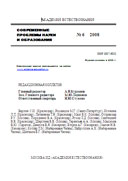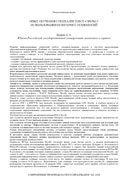PDF-версия статьи


|
Message of the president of Kazakhstan noted that "The world is entering the era of the fourth industrial revolution, an era of profound and rapid changes: technological, economic and social." This is directly related to the introduction of digital technologies in all sectors of the economy of our country, and especially in education. In the age of information technology, the approach to education has undergone significant changes. Today you can learn without spending much time in classrooms, and sometimes without leaving your home.
With the advent of the computer, the performance of many processes in a person’s life has become not only faster, but even more reliable and efficient, and it has become possible to perform many actions without leaving home. Buying tickets and booking hotels, ordering food, purchasing goods and services via the Internet - all this has long been part of our life. Today in Kazakhstan terms such as “e-government”, “e-learning”, “e-university” have become familiar.
It is not surprising that the most advanced technologies are used in the educational process, allowing you to get better results. The modern education system must not only arm the student with knowledge, but also, due to the constant and rapid updating of knowledge (every three years) in our era, form the need for continuous independent mastery of them, acquire the skills and abilities of self-education, as well as an independent and creative approach to knowledge during all active human life.
Education should become such a social institution that would be able to provide a person with a diverse set of educational services that enable them to study continuously, provide the general public with the opportunity to receive post-graduate and further education. This can be achieved using digital technology. In the modern world, the introduction of informatization into the field of education is considered as one of the most important means of its reforming and in many respects determines the paths for the further development of society.
Therefore, in all developed and in many developing countries large-scale programs of informatization of education are carried out, ways are being sought to improve the effectiveness of education, and significant investments are made in the development and introduction of new information technologies. Digital technologies in training allow us to present the subject being studied more colorfully using animations, which makes it possible to understand it better and, importantly, to motivate students to study the material.
Digital technologies change our way of life, ways of communication, ways of thinking, feelings, channels of influence on other people, social skills and social behavior. The hi-tech environment — computers, smartphones, video games, Internet search engines — redraws the human brain and enables him to find any information of interest to him. Therefore, raising digital literacy among students, starting at school, is one of the most important conditions for the formation of a modern personality.
Information is changing so quickly that the old methods and the education system itself have not kept pace with them, and it happens that by the time of graduation from the university, the knowledge gained by the students is outdated. Digital and information and communication technologies that are actively used in the educational process in many countries of the world can help in this, and one of its forms is distance education, which makes it possible to get an education at a distance without distancing from the main activity.
Therefore, it is very important to teach a specialist, independently using the Internet, to raise the level of their competence. Informatization of education touched foreign language education as well. In the Concept for the Development of Foreign
ОПУБЛИКОВАНО
Mombekova S.S., Tyumebekova L.T., Kozhaeva U.A., Baizhanova M.T., Bakhberdieva K.A. DIGITAL TECHNOLOGIES IN KAZAKHSTAN FOR TEACH AND STUDY SUBJECT ICT. // Современные проблемы науки и образования - 2018.-№6. (приложение "Технические науки"). - C. 9